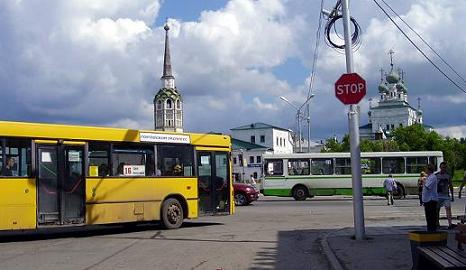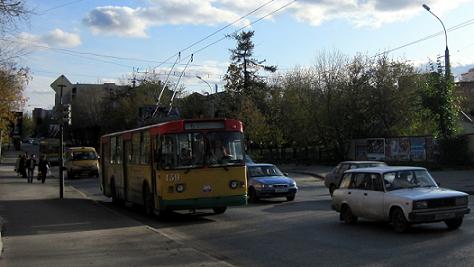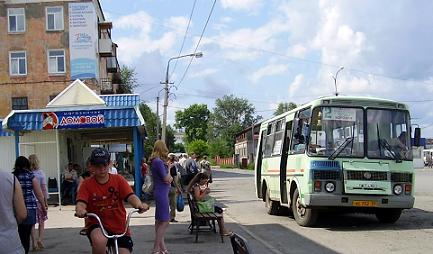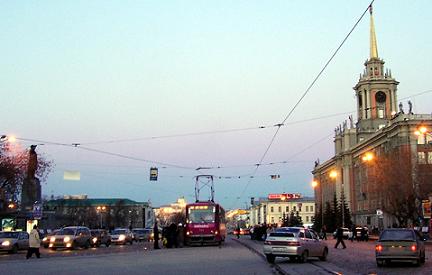Riding «общественный транспорт» [Public Transportation] the Russian Way Posted by josefina on Oct 9, 2009 in language, Soviet Union, Traditions
Sometimes «остановка трамвая» [a tram stop] look like this in even a larger Russian city – this picture was taken on the central «площадь 1905 (тысяча девятьсот пятого) года» [‘The Square of the Year 1905‘] here in «Ёбург» [‘Yekat’, it’s Russian slang for «Екатеринбург» (Yekaterinburg) since that takes far too long time to pronounce on a regular basis!]. Above you can clearly see how it’s done here in the wild East: you must both wait and get on the tram in middle of busy «проспект Ленина» [Lenin’s prospect] as cars rush by…
Some people do not own a car. Other people do not even have any «водительские права» [driver’s license]. These people have to «пользоваться общественным транспортом» [use public transportation]. I am one of these privileged people since «у меня нет ни машины, ни водительских прав» [I have neither a car nor a driver’s license]. But what about this makes me feel privileged? Because I have the constant opportunity to choose from the abundance of different means of public transportation here in Russia! Even though I’m really a devoted «пешеход» [pedestrian] and love «ходить пешком» [to walk on foot], there are times in life when one must «ездить на чём-то» [travel on something] in order to get where one is going. Remember the last post, in which I tried to sort out when to use the prepositions «в» and «на» in Russian? Remember how I promised to sort out these «предлоги» in combination with means of transportation in a separate post? Well, this is it! This is the post in which I’ll try to sort things out in this regard. First we must understand that there are many kinds of public transportation in Russia, and that it functions in a different manner then in, for example, Europe. I’ve lived in Russia for more than five years and I’ve seen a «расписание» [timetable; schedule] almost «на каждой автобусной остановке» [on every bus stop] but I’ve never seen buses keeping these times nor Russians expecting them to do so. Public transportation comes and goes as it pleases in this country. For some this might sound crazy (it did to me also in the beginning) but as a matter of fact it is not the least crazy. Russian public transportation WORKS! You never have to wait for «автобус» [the bus] in Russia. If there’s no bus, then there’s always «трамвай» [a tram] or «троллейбус» [a trolleybus]. But if both of there fail to show up one can always jump on «маршрутка» [a ‘marshrutka’] of which there comes about one every minute in average big Russian cities. And then there’s also to possibility of riding «метро» [the subway] in many bigger cities. Therefore one needs not have wheels of one’s own in this country. Not only because you’ll keep getting stuck «в пробках» [in traffic jams] anyway, but because there’s plenty of other – cheaper and more environmentally friendly! – ways of getting around.

«Автобусы» [pl. buses] exist in many different sizes, color and shapes in Russia. Here we have «жёлтый автобус» [a yellow bus] and «зелёно-белый автобус» [a green-white bus]. Very often in Russian cities you can see «старые автобусы из Европы» [old buses from Europe]. For example, «в Перми» [in Perm] there are many buses «из Дании и Германии» [from Denmark and Germany] and for me while riding them it was very entertaining because I felt like I was back in the past century’s Europe…
The preposition used with means of transportation in Russian is «на» [‘on’, ‘in’, ‘at’]. You can also use «творительный падеж» [instrumental case] with the very same means of transportation and the meaning remains pretty much the same. There’s of course nothing wrong with asking someone on the street on Moscow either of the following questions: «Можно добраться до музея Булгакова автобусом?» [Can you to get to the Bulgakov Museum by bus?] or «А доехать до Большого театра возможно трамваем?» [And is it possible to get to Bolshoi Theatre by tram?]. But let’s keep it simple today and focus with means of transportation in combination with the preposition «на». In all of the examples below I’m going to use the verb of motion «ехать» in all ways it can be changed in present tense:
«Я еду на трамвае» – [I’m going by tram].
«Ты едешь на метро» – [You’re going by subway (metro].
«Она едет на автобусе» – [She’s going by bus].
«Мы едем на троллейбусе» – [We’re going by trolleybus].
«Вы едете на маршрутке» – [You’re going by marshrutka].
«Они едут на машине» – [They’re going by car].

Behold my beloved: «троллейбус» [trolley bus; large vehicle which operates on electricity]. Since I come from a country where «троллейбусы» [pl. trolley buses] are a thing of the past – sadly – I was astonished the first time I saw one of these «в Санкт-Петербурге» [in Saint Petersburg] «в глубокой моей юности в 2004 (две тысячи четвёртом) году» [in my ‘deep’ youth in the year 2004]. While living in Siberia I further developed my love affair with this kind of Russian public transport and if there’s ever an opportunity to ride on of these babies I take it! Though there’s no real logic behind my love for the «троллейбус»… Behind it you should be able to spot the smaller and very orange «маршрутка» [which is short for «маршрутное такси»].
But when we’re using the preposition «на» together with means of transportation in Russian, we’re actually not speaking of location as such, but of a way of moving ahead; getting where you want to be, so to speak. If you want to express location within a mean of transportation in Russian, then the preposition you should use is «в» which in this case translates very simply into ‘in’ or ‘on’. Does that sound tricky to you? Let’s have a look at two helpful sentences using the word «поезд» [train] which I’m sure will clear up things a little bit at least:
«Вика любит путешествовать НА поезде» – [Vika loves to travel by train].
«Вика познакомилась со своим мужем В поезде» – [Vika met her husband on/in a train].

Of course I had to save the best – and worst! – to last. What is this, you wonder? Let me explain! This little square thingy is called by «русский народ» [the Russian people] for «пазик» [‘pazik’] which is made from the abbreviation «ПАЗ» standing for «Павловский автобусный завод» [Pavlovo Bus Factory]. In some Russian cities ‘pazikis’ perform the role of local ‘marshrutkas’. That’s okay. But very often here in the Urals they also traffic roads between smaller towns and villages and since they are the most uncomfortable mean of transportation ever invented by mankind riding them for more than an hour equals shaking until your insides feels like milkshake. «Не хорошо!» [Not good!]

Build vocabulary, practice pronunciation, and more with Transparent Language Online. Available anytime, anywhere, on any device.





Comments:
Karyn:
Great post, Josefina. I’ve never been able to sort out the names of all thise different types of transport. What about the electrichka? Is it the same as trolleybus?
Also – I love how you write out the pronounciation of years in your text. When I read for practice, I am never sure if I am getting the pronounciation write (it’s not always clear which case is used and which digits decline). I’d love to see a separate post with examples of numbers (especially years) being used in different cases and how they would be pronounced!
Thanks!
Karyn
Josefina:
Hi Karyn! I’m really glad you liked the post. The Russian ‘elektrichka’ equals a ‘suburban electric train’ and should’ve of course made it into the post! I completely forgot about, though it is – as the expression is – a chapter of its own among means of Russian public transportation… I’ve heard some stories, let me tell you!
Thank you, that’s a really good idea. I should make a post about how to pronounce years in Russian 🙂 be on the look-out!
Irina:
I’m a native Russian speaker. I’d like to say that using our prepositions is more various and difficult. You can also say “Я еду в абтобусе /в метро/ в трамвае” etc. (I’m going by bus / subway / by tram) if you mean “inside bus etc.” Or you don’t need to use a preposition in the phrase “Вика любит путешествовать/ ездить поездом” (Vika loves to travel by train).
Saint Facetious:
Zdec v Gruzie, u nac jiolti avtobusui i marshutki (i v Tbilise, metro). U nix net racpicaniix. Chto eto racpicanie? Nikto ni znaet. I u net kart (route maps?), well, non posted. You just have to guess and good luck, bon voyage. It seems to work for Georgians, but I prefer the Russian system of at least having a posted timetable and route map, so you can sort of expect when the next bus after the one you just missed is coming. But I guess the Soviets couldn’t perfect everyone’s system.
kniga:
Вспоминаю с ностальгией как когда то толкался в трамвае, будучи подростком, я также умел блокировать трамвайные двери там над выходом над дверьми надо вставить между контактами спичечный коробок